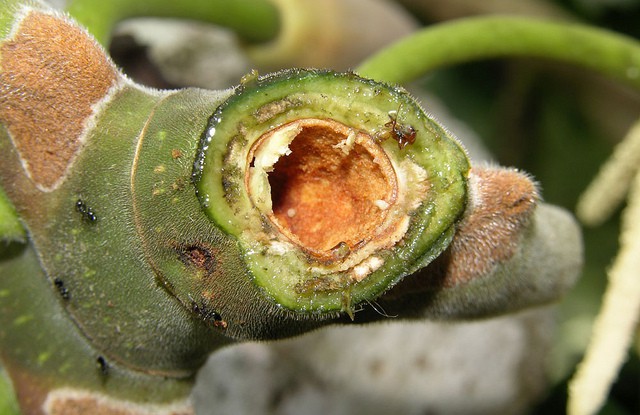BOGOR, Indonesia (2 March, 2012)_Initial research into invasive alien tree species Cecropia peltata, a South and Central American native that has infiltrated Indonesia, warns of the potential harm it could cause the country and advises locals take preventive action.
“There are many, many aliens spreading and little attention to the potential problems that these may one day cause,” said Douglas Sheil, Senior Associate with the Center for International Forestry Research and co-author of the study Innocent invaders? A preliminary assessment of Cecropia, An American tree in Java.
“As in other countries, alien species are considered to negatively impact the natural environment by replacing indigenous species and decreasing crop production,” CIFOR research officer and fellow author Michael Padmanaba added.
At least four Cecropia species were introduced to the Bogor Botanical Gardens in West Java in the early twentieth century. Cecropia peltata is the only one of these species that has extensively spread outside the 87-hectare gardens, which it likely did sometime after 1943.
The scientists, who focused on low-cost approaches that can be widely adopted, conducted 28 trips around the region using GPS and engaging a wide network of informal assistants to track the species. They detected the furthest it had spread was to just inside Jakarta.
Cecropia peltata L. has been listed by the International Union for Conservation of Nature Invasive Species Specialist Group “As among one of the world’s top 100 invaders”. However, initial findings could not confirm Cecropia peltata as noxious. In fact, Sheil points out it may also have positive effects on the environment such as providing habitat to fauna or protecting open soils.
The research notes this does not cancel out its potential long-term threat. While only a minority of alien species become harmful, those that do may appear harmless for years or decades. As Cecropia spreads, it reaches new geographical conditions where populations continue to evolve and of which the implications cannot be foreseen.
Cecropia could potentially interfere with the ecosystem, leading to a change in pollinators and plant pests, the research says. It may threaten built structures such as roots. It could also facilitate the invasion of additional species and modify key ecosystem properties such as nutrient dynamics.
The Convention on Biological Diversity where Indonesia is a signatory requires members to “Eradicate those alien species that threaten ecosystems, habitats or species”.
Sheil’s consultations with local agencies in Java showed that no efforts had been made to assess the threat of these alien trees or control their spread in Indonesia.
The tree produces large amounts of seeds, which can remain fertile for years until germination is stimulated by forest disturbance. The seeds are dispersed at a great rate in the Neotropics. They are consumed by birds and bats, which can carry seeds several kilometres. These factors, and the extensive area already covered by the tree, make control a challenge. If action is needed it is best to act soon before the tree spreads more widely.
“Better attention on alien species is needed,” Sheil said. “The limitations are basic neglect, and a lack of funds and clear decision-making processes.”
The paper calls for improved technical knowledge and more input from community leaders, the local government and agencies such as the Foresty Ministry’s Forestry Research and Development Agency, to conduct surveys and formulate intervention plans to control the spread.
“If there is no public support it will be hard and may be impossible [to counter this threat],” Sheil said.
“But we also need more sophisticated ways to judge what types of responses are warranted with more widespread species,” Sheil said.
“Not all aliens are a problem so the better we can make these judgments the more resources we can save to focus on the real problems.”
Sheil has begun further research into alien species in national parks in Uganda with the Institute of Tropical Forests Conservation.
“We are looking to see if [alien species] need to be controlled or decline in significance if other factors can be controlled,” he said. “Many of these species thrive in disturbed habitats. If we can reduce the disturbance, we hope the aliens will disappear.”
To the people back on home soil, Sheil says: “I hope people take more notice of the Cecropia and can gather together those who could do something about it.”
We want you to share Forests News content, which is licensed under Creative Commons Attribution-NonCommercial-ShareAlike 4.0 International (CC BY-NC-SA 4.0). This means you are free to redistribute our material for non-commercial purposes. All we ask is that you give Forests News appropriate credit and link to the original Forests News content, indicate if changes were made, and distribute your contributions under the same Creative Commons license. You must notify Forests News if you repost, reprint or reuse our materials by contacting forestsnews@cifor-icraf.org.

